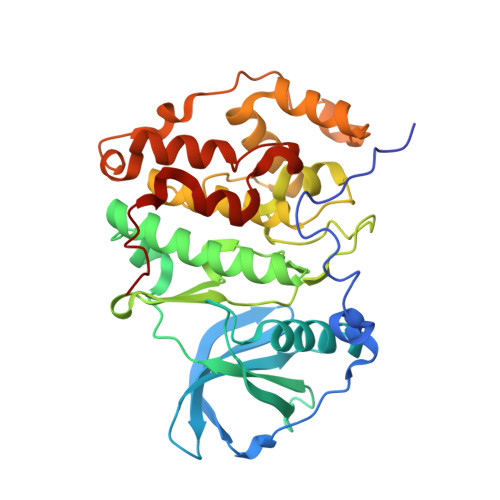A detailed thermodynamic profile of cyclopentyl and isopropyl derivatives binding to CK2 kinase
Kinoshita, T., Sekiguchi, Y., Fukada, H., Nakaniwa, T., Tada, T., Nakamura, S., Kitaura, K., Ohno, H., Suzuki, Y., Hirasawa, A., Nakanishi, I., Tsujimoto, G.(2011) Mol Cell Biochem 356: 97-105
- PubMed: 21735094
- DOI: https://doi.org/10.1007/s11010-011-0960-9
- Primary Citation of Related Structures:
3AT2, 3AT3, 3AT4 - PubMed Abstract:
The detailed understanding of the molecular features of a ligand binding to a target protein, facilitates the successful design of potent and selective inhibitors. We present a case study of ATP-competitive kinase inhibitors that include a pyradine moiety. These compounds have similar chemical structure, except for distinct terminal hydrophobic cyclopentyl or isopropyl groups, and block kinase activity of casein kinase 2 subunit α (CK2α), which is a target for several diseases, such as cancer and glomerulonephritis. Although these compounds display similar inhibitory potency against CK2α, the crystal structures reveal that the cyclopentyl derivative gains more favorable interactions compared with the isopropyl derivative, because of the additional ethylene moiety. The structural observations and biological data are consistent with the thermodynamic profiles of these inhibitors in binding to CK2α, revealing that the enthalpic advantage of the cyclopentyl derivative is accompanied with a lower entropic loss. Computational analyses indicated that the relative enthalpic gain of the cyclopentyl derivative arises from an enhancement of a wide range of van der Waals interactions from the whole complex. Conversely, the relative entropy loss of the cyclopentyl derivative arises from a decrease in the molecular fluctuation and higher conformational restriction in the active site of CK2α. These structural insights, in combination with thermodynamic and computational observations, should be helpful in developing potent and selective CK2α inhibitors.
Organizational Affiliation:
Graduate School of Science, Osaka Prefecture University, 1-1 Gakuen-cho, Naka-ku, Sakai, Osaka 599-8531, Japan. [email protected]















